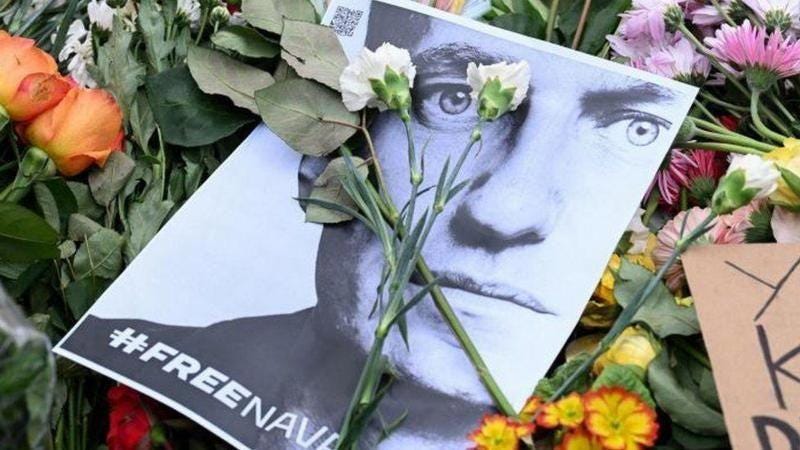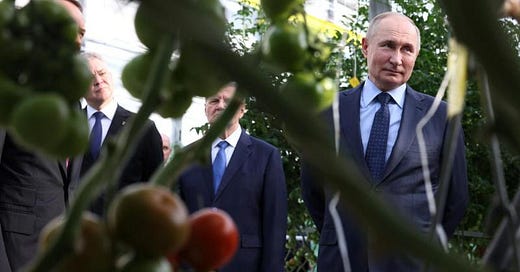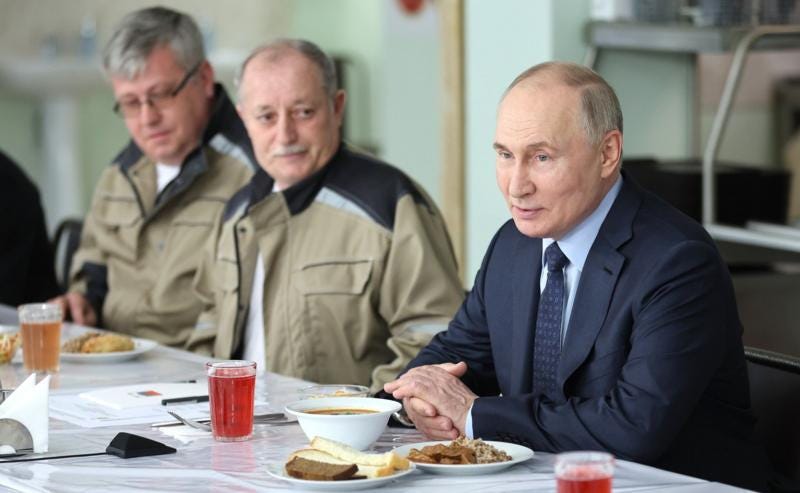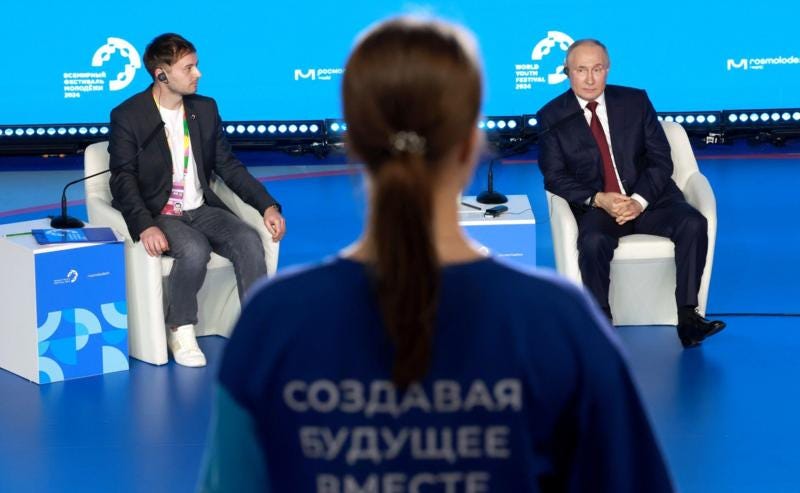Tomatoes, a short history of Belgium, and ‘beautiful ladies': on the campaign trail with Vladimir Putin
Voting has started in an election that will gift the Russian president at least another six years in the Kremlin. BBC Russian takes a look at Putin’s recent ‘meet and greets’ with the public.
By Andrei Kozenko.
Over the past few weeks, Vladimir Putin has travelled around Russia and met soldiers, workers, scientists, farmers and students. You might term the meetings ‘pre-election’, given their format, but you would be missing an important nuance: words like ‘ballot,’ ‘candidate,’ or ‘chances of winning’ were not on anyone’s lips.
Putin doesn’t like election campaigning, and has admitted as much himself, calling it “a shameless business.” Nor has Putin ever taken part in pre-election debates: they’re either “not interesting” or “pointless.”
If, back in the early 2000s, he felt he ought to talk about the threat of terrorism, or in 2012 he had to thank the workers at a tank factory in the Urals for being ready to liberate Moscow from “liberals,” this time round the president hasn’t really had much to say. Even the ‘special military operation’ in Ukraine (this is the Kremlin’s preferred name for the war in Ukraine) has been little more than the background to his public appearances before the people.
"To new frontiers!”
“You know, I would like to add something. The organisers of this event have allowed me to ask you any question at all, without limits,” said Olga Lyubetskaya, a participant in a meeting with Putin held for students and factory workers in the Chelyabinsk region.
“And I thought about it, and I thought about it, and you know what - I have no questions for you!"
“Onwards! Good luck! To new frontiers!” replied Vladimir Putin.
(The quotes here, and those below, are taken from the official Kremlin website.)
The meeting was taking place on the morning of February 16th. Putin was already aware that his main political adversary, Alexei Navalny, had died in a polar prison camp. (His press secretary Dmitry Peskov had spoken of it, and the journalists accompanying the president on the trip also knew about it.) But Putin did not mention his opponent’s death, and the workers and students listening to him did not ask about it. Nor was anyone to ask a question about Navalny at later meetings.

But while he was in Chelyabinsk, Putin did show great interest in a sport called ‘chess boxing’ – a mixture of the board game and organised fighting, described to him by one of the female students.
“Fascinating. When you see somebody playing and playing chess, and sorry, something goes off and – boom! – they step into the ring and – bam! – it all falls into place,” commented Putin.
“Or the other way round: when something goes off in the ring, but then you sit down to play chess – and everything is sorted out in your mind as it ought to be. Well, either way it’s interesting.”
Who invented Belgium?
At the World Youth Festival in Moscow earlier this month, a Belgian anaesthesiologist called Matyas Kovacs told Putin that he was learning the Russian language via the TV series ‘The Interns’. He asked the president how he might understand the Russian soul.
Putin replied with some general words, saying it was “a subtle substance,” before unexpectedly declaring: “By the way, Belgium – you probably know yourself – appeared on the map as an independent state in large part thanks to Russia and the stance Russia took.”
Kovacs had nothing to offer in reply, while the Belgian media accused Putin of re-writing history – because the truth of the matter is that Belgium became an independent state after it was transferred from France to the Netherlands in 1830, triggering a popular uprising. The king asked Tsar Nicholas I to intervene, but the latter refused, having neither the desire nor the resources to help out. The European powers resolved the conflict among themselves that same year. And that’s all there is to say about the role of Russia in the creation of Belgium.
“It depends what we’re drinking”
At times, the meeting with farmers from Stavropol region was reminiscent of a sit-com.
“Vladimir Vladimirovich, I was keen to ask you. Do you prefer cucumbers or tomatoes most of all?” asked Irina Yenina, a technician at the ‘Gift of the Sun’ enterprise.
“It depends what we’re drinking,” replied Putin instantly. “But if we’re being serious, I like both.”
That said, the ‘Verstka’ publication reported in June 2023 that Putin himself “almost never touches alcohol,” is “extremely averse to drinkers,” and has even held a number of meetings about the harm caused by alcohol. The publication’s sources said that those he was addressing at the meetings were officials of all ranks, who had significantly increased their drink consumption after the start of the war in Ukraine.
At the Stavropol event, inspired by tomatoes picked from the vine, Putin asked to be introduced to the local farm manager. It turned out not to be possible – because the manager was fighting in the ‘special military operation.’
One idea proposed on the spot was to rename ‘agronomists’ as ‘plant designers’, in order to attract youth to the profession. The conservatively-minded Putin rejected the idea.
And for a finale, agriculture minister Dmitri Patrushev caught Putin off guard. He told him that in Russia there was a “holiday of onions”. Responding to the president’s surprise, the minister assured him, “it is celebrated in a number of regions.”
A pan-Russian, not just regional, ‘Onion Day’ is indeed marked by enthusiasts each year on September 9th. It dates back to a pagan festival. There are also three feast days of St Luke [the Russian word for onion is ‘luk’] on May 5th, June 11th and October 31st. In certain parts of the country, dishes made from onions are prepared on the holidays. Which of the celebrations Patrushev had in mind when he was talking to Putin was not made clear.
Putin and a little sentimentality
At the meeting with participants in the World Youth Festival, Vladimir Putin was asked which films had shaped him when he was growing up.
“Films like ‘Cheburashka’ today [a classic children’s animation character] but made back then. Kind hearted, a little sentimental, that bring to life the best human qualities: kindness, creativity, helping those who are close to you. Films like that,” Putin said unexpectedly. The actress Dasha Kukarskikh, who asked him the question, had said in her preamble to it that she had just visited the ‘new territories’ annexed by Russia in Ukraine, and had completed a film there.
But Putin instead developed his thoughts on old cartoons and compared them to modern ones: “And of course, this is something we must pass on to our children, because what is being made today is probably very technological, it flashes before your eyes, with shooting, it’s noisy, it blows up, everyone is chasing everyone else, but they can’t catch them, and when they do, they always hit each other on the head. Is this what a child always needs? I don’t know, I am not so sure.”
Putin’s fondness for Soviet cartoons has long been known. In December 2011, addressing the leaders and participants of opposition protests demanding fair elections, allegedly backed by ‘western money,’ he said “Come to me, Bandar-log!” [a Hindi expression meaning ‘monkey people’ or ‘chattering people’ from The Jungle Book] adding “I have loved Kipling since I was a child.”
The problem is the phrase does not appear in the book, but only features in a Soviet remake of the Disney cartoon.
Putin and odd quotations
At the close of his meeting with participants in the World Festival of Youth, Putin said “We had a statesman, a military leader of German origin – Marshal, I think, or Field Marshal Münnich, who said that Russia is a country under the direct rule of God, because otherwise it is not clear how it would exist at all.”
Putin went on to say that he was certainly in agreement with the first part of the quotation, but disagreed with the second, because Russia exists thanks to the talent and loyalty of its people.
Field Marshal von Münnich was a man with a complicated fate. He was an associate of Peter the Great and took part in many battles. Under Empress Elizabeth he was sentenced to death for treason, commuted to 20 years in exile. He was rehabilitated under Peter III.
Yet the sentence about God and Russia was not uttered by the elder Münnich but by his son, Johann, who was in charge of collecting customs duty in Russia. His sentiment was ironic: only God know, as it were, how things don’t fall apart here.
For the ‘beautiful ladies’
Putin has spoken of his views on women emphatically throughout his career – not least on every March 8th, International Women's Day: they should look after the children while keeping the home cosy. This year, the target of his words was a young Frenchwoman, Israa Skan, who asked Putin what advice he would give to girls who wanted to work “in the field of diplomacy.”
In reply, Putin didn’t say a word about diplomacy. According to him, a woman “should always remain a woman, should remain a beloved person, should cultivate a certain atmosphere around herself, in the family home, of course. The purpose of a woman is to continue the family lineage, and this is an absolutely unique gift of nature.”
Putin continued, “We men, of course, all expect a woman to stay attractive, charming and tender. How a woman can manage this – pursue a career, remain physically attractive – I don’t know. It is a woman’s secret that I don’t even try to delve into.”
And so, in the run-up to the 2024 elections, questions of equality, and the support of partners for each other in the home and in their careers, remain a mystery to Vladimir Putin.
BBC is blocked in Russia. We’ve attached the story in Russian as a pdf file for readers there.
Read this story in Russian here.
English version edited by Chris Booth.
LONG READ: How Russian diplomacy lost its influence on Putin and failed to stop the war
Over the past decade the Russian Foreign Ministry has been increasingly sidelined, powerless to influence policy, and reduced to echoing the aggressive rhetoric coming from the Kremlin.







